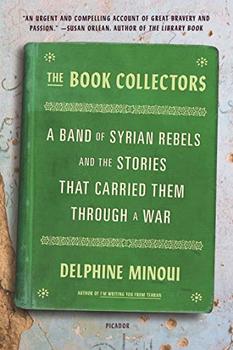Summary | Excerpt | Reviews | Beyond the Book | Readalikes | Genres & Themes | Author Bio

A Band of Syrian Rebels and the Stories That Carried Them Through a War
by Delphine MinouiExcerpt
The Book Collectors
At first Ahmad is a distant voice coming through my computer speakers. A fragile whisper from a hidden basement. When I first make contact with him on Skype, on October 15, 2015, he hasn't left Daraya in nearly three years. Located fewer than five miles from Damascus, his town is a sarcophagus, surrounded and starved by the regime. He is one of twelve thousand survivors. In the beginning, I struggle to understand what he is saying. He mumbles, timid but keyed up, his words broken by the omnipresent crackling of explosions. Between detonations, I try to focus on his face. He appears on my computer screen, then disappears, at the mercy of an internet connection patched together from small satellite dishes smuggled from abroad in the early days of the revolution.
His image stretches and deforms like a Picasso portrait: round cheeks slant at an angle under black-rimmed glasses before breaking into a million cubic pieces and fading behind a thick black curtain. When the pixels come back together, I listen carefully and try to read his lips, chewing on my pencil.
He introduces himself. Ahmad, twenty-three years old, born in Daraya, one of eight children in his family. Before the revolution, he studied civil engineering at Damascus University. Before the revolution, he liked soccer, movies, and being around plants in his family's nursery. Before the revolution, he dreamed of becoming a journalist. His father quickly dissuaded him from the idea, having himself spent twelve months in prison for a simple remark whispered to a friend. "Insult to power," the court had ruled. That was 2003, when Ahmad was eleven. A somber memory that had burrowed deep inside him.
Then the revolution. When Syria rouses in March 2011, Ahmad is nineteen, a rebellious age. His father, still traumatized from jail, forbids him to go into the streets. Ahmad misses the first protest held in Daraya, but sneaks into the second one. He joins the crowd, chanting at the top of his lungs: "One, one, one, the Syrian people are one." In his chest, inside this budding revolutionary, something rips, like a sheet of paper. His first sensation of freedom.
Weeks, then months go by. The protests are unending, too. Bashar al-Assad's voice shouts menacingly from transistor radios. "We will win. We will not yield. We will eliminate the dissenters." Regime forces shoot into the crowd. The first bullets whistle, but Ahmad and his friends chant even louder—"Freedom! Freedom!"—as other resisters take up weapons to protect themselves. Unable to imprison them all, Syria's president decides to put their town under lockdown. It's November 8, 2012. Like many others, Ahmad's family pack their suitcases and escape to a neighboring town. They beg him to follow. He refuses—this is his revolution, his generation's revolution. Ahmad gets hold of a video camera and finally realizes his childhood dream: he will expose the truth. He joins the media center run by the new local council. In the daytime, he roams the devastated streets of Daraya. He films houses ripped apart, hospitals overflowing with the injured, burials for the victims, traces of a war invisible and inaccessible to foreign media. At night, he uploads his videos to the internet. One year of paralyzing violence goes by, full of hope and uncertainty.
One day in late 2013, Ahmad's friends call him—they need some help. They found books that they want to rescue in the ruins of an obliterated house.
"Books?" he repeats in surprise.
The idea strikes him as ludicrous. It's the middle of a war. What's the point of saving books when you can't even save lives? He'd never been a big reader. For him, books smack of lies and propaganda. For him, books recall the portrait of Assad and his long giraffe neck that mocked him from his schoolbooks. After a moment of hesitation, he follows his friends through a gouged-out wall. An explosion has ripped off the house's front door. The disfigured building belongs to a school director who fled the city and left everything behind. Ahmad cautiously feels his way to the living room, illuminated by a single sliver of sunlight. The wood floor is carpeted with books, scattered amid the debris. With one slow movement, he kneels to the ground and picks one at random. His nails flick against the dust-blackened cover, as if against the strings of a musical instrument. The title is in English, something about self-awareness, a psychology book, no doubt. Ahmad turns to the first page, deciphers the few words he recognizes. It turns out the subject doesn't matter. He's trembling. His insides turn to jelly. An unsettling sensation that comes with opening the door to knowledge. With escaping, for a second, the routine of war. With saving a little piece, however tiny, of the town's archives. Slipping through these pages as if fleeing into the unknown.
Copyright © 2017 by Éditions du Seuil
Translation copyright © 2020 by Lara Vergnaud




The dirtiest book of all is the expurgated book
Click Here to find out who said this, as well as discovering other famous literary quotes!
Your guide toexceptional books
BookBrowse seeks out and recommends the best in contemporary fiction and nonfiction—books that not only engage and entertain but also deepen our understanding of ourselves and the world around us.